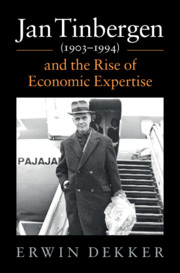Book contents
- Jan Tinbergen (1903–1994) and the Rise of Economic Expertise
- Historical Perspectives on Modern Economics
- Jan Tinbergen (1903–1994) and the Rise of Economic Expertise
- Copyright page
- Dedication
- Contents
- List of Figures/Tables
- Preface
- Acknowledgments
- Part I Becoming an Economic Expert
- 1 The Construction of Peace
- 2 A Progressive Education
- 3 The Bourgeois Socialist
- 4 From Ehrenfest to the Econometric Society
- 5 Hendrik de Man and Jan Tinbergen
- 6 Macro-dynamics and the Problem of Unemployment
- 7 The Rise of the People’s Party (Volkspartei) and the Economics of the General Interest
- Part II The Years of High Expertise
- Part III Global Expertise
- Part IV The Limits of Expertise
- Bibliography
- Index
- Series page
7 - The Rise of the People’s Party (Volkspartei) and the Economics of the General Interest
from Part I - Becoming an Economic Expert
Published online by Cambridge University Press: 11 June 2021
- Jan Tinbergen (1903–1994) and the Rise of Economic Expertise
- Historical Perspectives on Modern Economics
- Jan Tinbergen (1903–1994) and the Rise of Economic Expertise
- Copyright page
- Dedication
- Contents
- List of Figures/Tables
- Preface
- Acknowledgments
- Part I Becoming an Economic Expert
- 1 The Construction of Peace
- 2 A Progressive Education
- 3 The Bourgeois Socialist
- 4 From Ehrenfest to the Econometric Society
- 5 Hendrik de Man and Jan Tinbergen
- 6 Macro-dynamics and the Problem of Unemployment
- 7 The Rise of the People’s Party (Volkspartei) and the Economics of the General Interest
- Part II The Years of High Expertise
- Part III Global Expertise
- Part IV The Limits of Expertise
- Bibliography
- Index
- Series page
Summary
Chapter 7 is one of three chapters that reflects on the rise of economic expertise during the twentieth century. It places the development of Tinbergen’s econometric techniques within a broader political context in which political parties during the middle of the twentieth century moved away from ideological and class-based foundations and toward general interest parties, known as people’s parties (or in German Volksparteien). This generated a demand from within politics for a new type of economic expert, who served no longer as party ideologues, but rather as policy experts. This was most visible in the social-democratic parties, such as the Dutch SDAP, which transformed in the PvdA (Labor Party). During the same period economists presented themselves increasingly as experts to the state, who could scientifically pursue the general interest. These developments run counter to the more widely known story about economics becoming a value-free science as proclaimed by Lionel Robbins. The chapter argues that Tinbergen’s contributions are best understood as a continuation of the German tradition of Staatswissenschaften, which pursued economics in service of the state.
- Type
- Chapter
- Information
- Jan Tinbergen (1903–1994) and the Rise of Economic Expertise , pp. 155 - 160Publisher: Cambridge University PressPrint publication year: 2021

